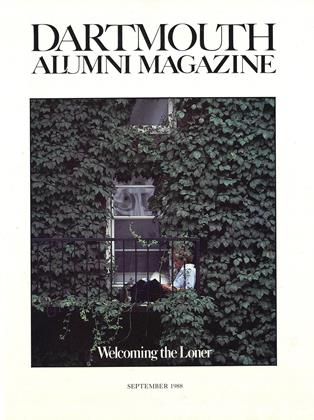If a Chilean delegation wants to meet the chief justice of the Supreme Court, or if a nearsighted tourist slips on the Court's marble steps, it's likely to come to the attention of Noel Augustyn '68. Augustyn has been administrative assistant to Supreme Court Chief Justice William Rehnquist since early 1987. "It's kind of like being mayor of a small city," according to Augustyn. The Court has more than 300 employes, including a police force, a seamstress, and a barber, its own museum, publishing house, and gymnasium.
The administrative assistant position was created by Congress in 1972 to aid in the increasingly complex planning and leadership duties of the chief justice as head of the judicial branch of government. Augustyn's responsibilities are wide-ranging, from serving as curator of the Court's museum to overseeing an internship program. At his weekly meetings with Rehnquist Augustyn may bring up matters as far-reaching as salary increases for federal employes or as mundane as what to do with a grand piano recently acquired by the Court.
As an undergraduate at Dartmouth Augustyn was already interested in a law career, serving on the judiciary committees of the Inter-Dormitory Council and of Alpha Chi Alpha fraternity. He earned an MA. in English education from Stanford and taught at the college level for a few years before earning his law degree at Notre Dame. He practiced law for six years, then returned to higher education as an assistant dean at Boston College Law School. Next he was an adjunct professor at Georgetown University Law Center, and associate director of the Association of American Law Schools before going to work for Chief Justice Rehnquist.
"Rehnquist is a good guy to work for, an eminently normal human being," says Augustyn. "I like to describe him as somebody who writes his own speeches and pumps his own gas. He's not a workaholic." That means Augustyn can find time to be with his wife, Ann, an attorney for the Department of Energy, and their two children.
The Supreme Court, said Augustyn, operates like nine very independent little law firms. He reports only to the chief justice and is not involved at all with the case-deciding aspect of the Court. But as administrative assistant, he has learned the answer to a question about the Supreme Court which had piqued his curiosity since his law school days. "In law school you read these opinions and dissents where the justices stop just short of calling each otherfools. You wonder how they manage to get along, how they confront each other day after day after having read what they say about each other. What I've learned is that they treat each other with extraordinary civility and deference. You'll never see one justice go up to another and slap him on the back; even after working together for 15 years, whenever they see each other they just shake hands.
 View Full Issue
View Full Issue
More From This Issue
-
 Cover Story
Cover StoryWelcoming the Loner
September 1988 By Victor F. Zonana '75 -
 Feature
FeatureFrom America's Lost Cohort, the Shards of Souls
September 1988 By David R. Boldt '63 -
 Feature
FeatureIn the Galactic Search for Intelligence, We May Find Ourselves
September 1988 By Jack Baird -
 Feature
FeatureIS DARTMOUTH STILL DARTMOUTH?
September 1988 By Jay Heinrichs -
 Feature
FeatureHow to Come Back
September 1988 -
 Sports
SportsFall Sports Preview
September 1988
TERI ALLBRIGHT
-
 Article
ArticleClovers Bring Good Luck to Octogenarian
MARCH 1983 By Teri Allbright -
 Article
ArticleDouglas Storer '2l: His own best "Amazing but True" tale?
APRIL 1983 By Teri Allbright -
 Article
Article"Statistical voyeurism": a peep at the class of '58
MAY 1983 By Teri Allbright -
 Article
ArticleLarry Huntley '50: A lifetime of "affirmative" minis try
November 1983 By Teri Allbright -
 Feature
FeatureHeeding the Beat of a Different Drummer
SEPTEMBER 1987 By Teri Allbright -
 Feature
FeatureTesting the Body's Competitiveness
NOVEMBER • 1987 By Teri Allbright







